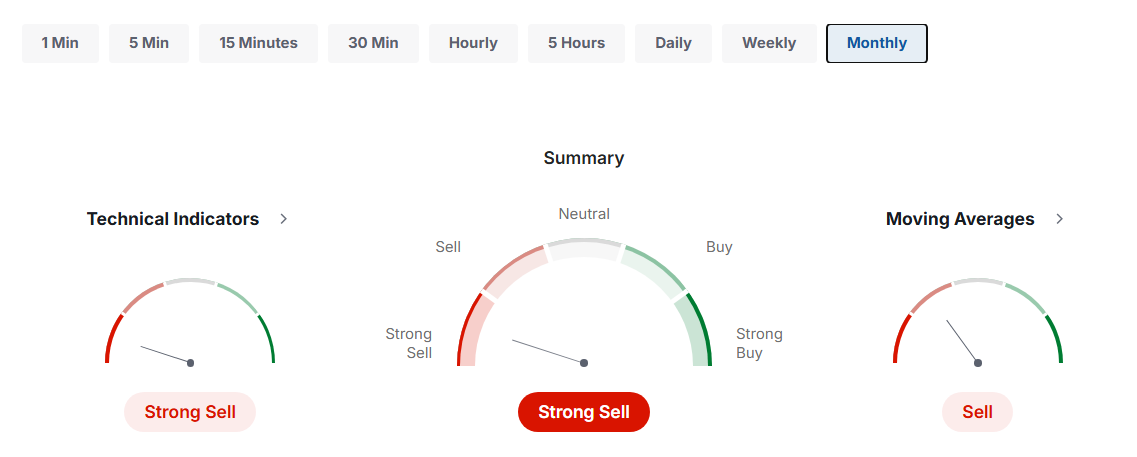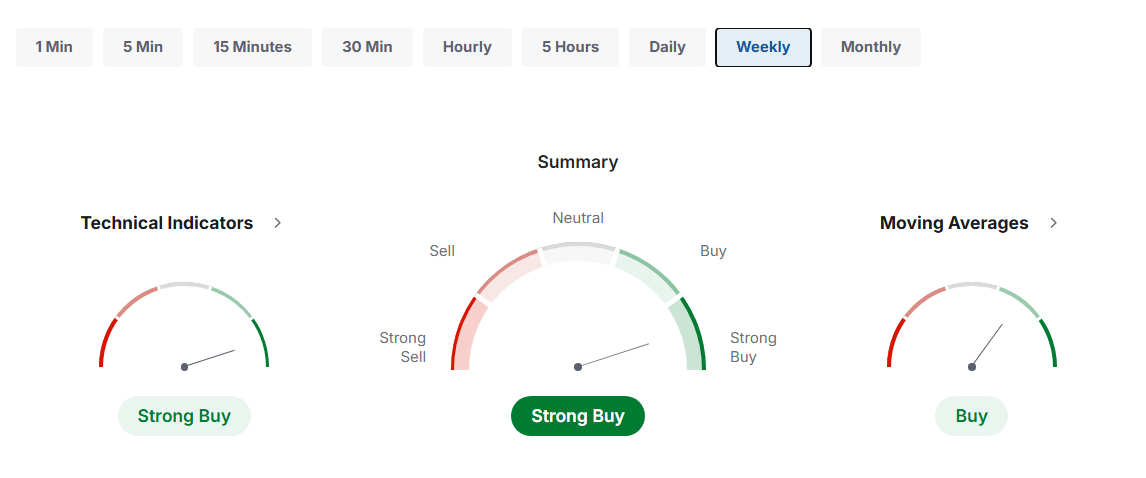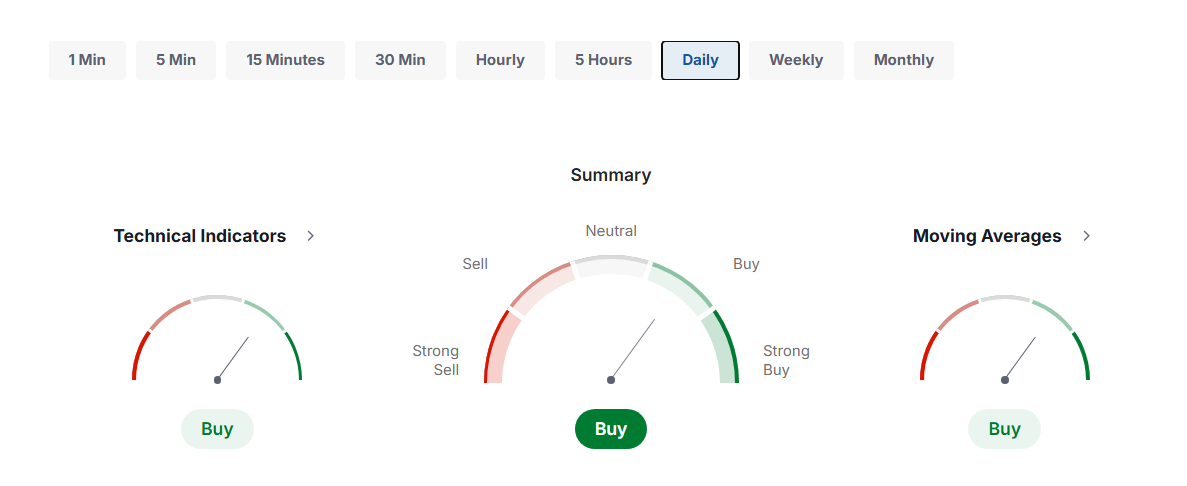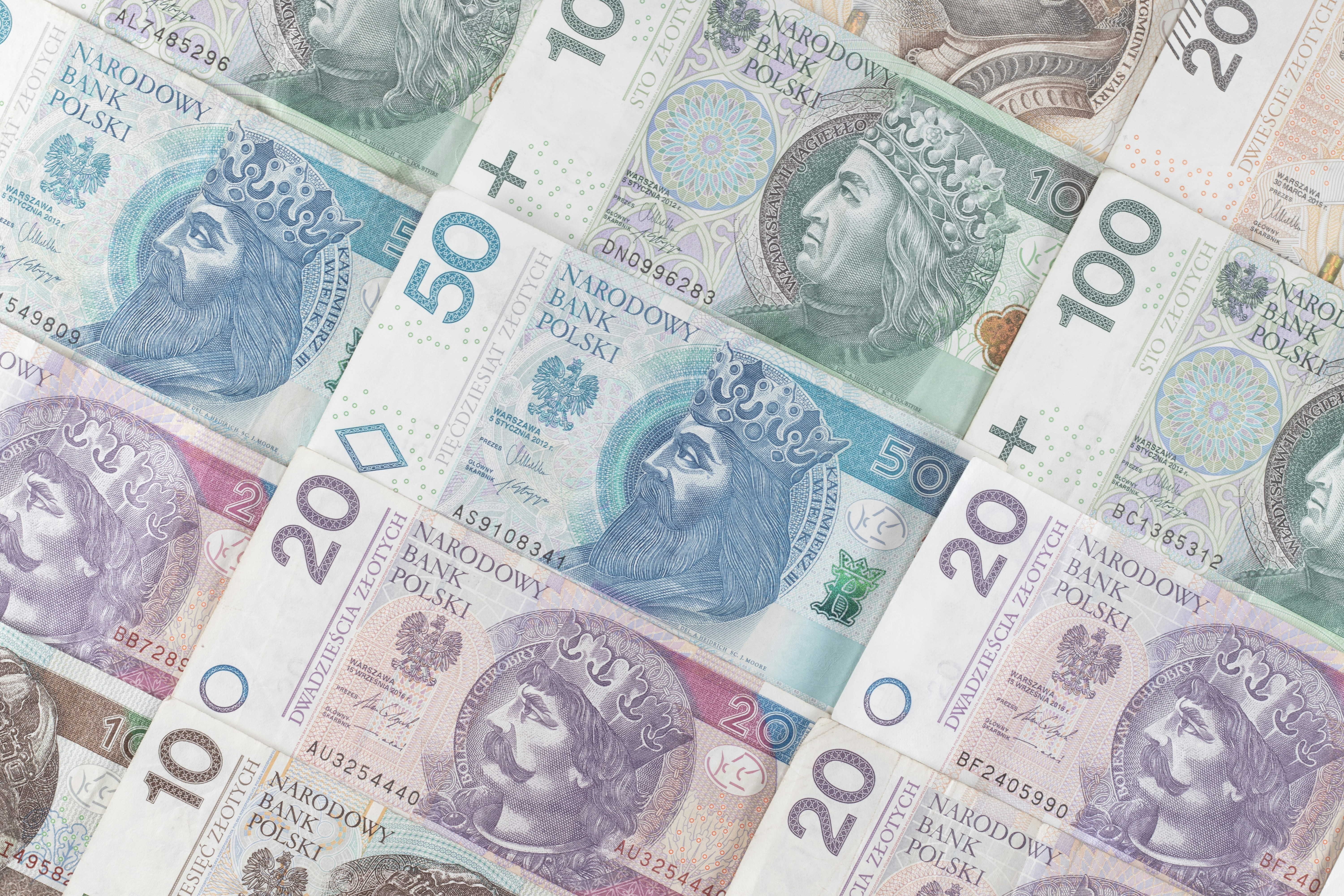DKK para PLN Previsão: Coroa dinamarquesa para Zloty Taxa de Câmbio Previsão
)
A previsão da taxa de câmbio da coroa dinamarquesa tem tido um interesse crescente ultimamente, com os investidores a analisarem a direção potencial do par DKK para PLN. Como a coroa é sensível aos desenvolvimentos económicos e políticos na UE, a análise técnica dos gráficos de preços pode fornecer informações sobre os níveis de suporte, resistência e tendência. Este guia irá ajudá-lo a formar uma imagem clara deste par de moedas no mercado e fornecer várias previsões sobre o curso da coroa dinamarquesa para o zloty polaco numa perspetiva de curto e longo prazo.
Índice
SOBRE A PREVISÃO DA TAXA DE CÂMBIO COROA DINAMARQUESA / ZLOTY POLACO
ANÁLISE TÉCNICA DA COROA DINAMARQUESA
HISTÓRICO DE PREÇOS DKK/PLN
COROA DINAMARQUESA PARA ZLOTY PREVISÃO PARA 2025
COROA DINAMARQUESA PARA ZLOTY PREVISÃO PARA 2026
COROA DINAMARQUESA PARA ZLOTY PREVISÃO PARA 2027
PREVISÃO DE COROA DINAMARQUESA PARA ZLOTY PARA 2028
PREVISÃO DA COROA DINAMARQUESA PARA O ZLOTY EM 2029
COROA DINAMARQUESA PARA ZLOTY PREVISÃO PARA 2030
O QUE AFECTA A TAXA DKK/PLN?
COMO PREVER A TAXA DE CÂMBIO DKK/PLN
CONCLUSÃO
PERGUNTAS FREQUENTES
SOBRE A PREVISÃO DA TAXA DE CÂMBIO COROA DINAMARQUESA / ZLOTY POLACO
Em abril de 2025, a taxa de câmbio entre a coroa dinamarquesa (DKK) e o zloti polaco (PLN) situava-se em cerca de 0,573 PLN por 1 DKK. Isto reflete uma apreciação modesta em relação ao mínimo do ano de 0,5550 PLN observado em 26 de fevereiro de 2025.
Olhando para o futuro, os analistas financeiros prevêem uma tendência neutra a ligeiramente negativa para o par DKK/PLN.
| Ano |
Preço máximo (zł) |
Preço mínimo (zł) |
Preço médio (zł) |
| 2025 | 0.574 | 0.562 | 0.5668 |
| 2026 | 0.562 | 0.543 | 0.5517 |
| 2027 | 0.543 | 0.524 | 0.5328 |
| 2028 | 0.524 | 0.505 | 0.5138 |
| 2029 | 0.505 | 0.486 | 0.4947 |
| 2030 | 0.486 | 0.476 | 0.4820 |
Principais conclusões
- A taxa DKK PLN é de 0,573.
- Ao longo de 2025, a DKK poderá descer ligeiramente.
- Devido à volatilidade do mercado cambial, as opiniões dos especialistas sobre a previsão da DKK podem variar, mas a tendência geral é de neutra a negativa.
ANÁLISE TÉCNICA DA COROA DINAMARQUESA
A análise técnica atual para a taxa de câmbio da coroa para o zloty polaco mostra sinais mistos. Os gráficos mensais revelam um sentimento de forte baixa, sugerindo uma pressão descendente sobre o par de moedas DKK/PLN. No entanto, os gráficos semanais prevêem movimentos de alta, mudando os sinais de compra para compra forte. Os gráficos diários também indicam um sentimento de alta, com a taxa de câmbio do PLN a aproximar-se dos principais níveis de resistência, o que afecta as actuais previsões de taxas.



HISTÓRICO DE PREÇOS DKK/PLN
O histórico de preços da taxa de câmbio da coroa dinamarquesa para o zloti polaco indica uma clara tendência descendente ao longo do período de dois anos, de janeiro de 2023 a dezembro de 2024. Começando em cerca de 0,6307 PLN por coroa dinamarquesa, a taxa diminuiu de forma constante, atingindo aproximadamente 0,5731 PLN no final de 2024.
| Mês |
DKK para PLN Taxa |
| janeiro de 2023 | 0.630752 |
| fevereiro de 2023 | 0.636919 |
| março de 2023 | 0.630077 |
| abril de 2023 | 0.622851 |
| maio de 2023 | 0.609606 |
| junho de 2023 | 0.599068 |
| julho de 2023 | 0.596520 |
| agosto de 2023 | 0.597830 |
| setembro de 2023 | 0.616209 |
| outubro de 2023 | 0.605350 |
| novembro de 2023 | 0.590637 |
| dezembro de 2023 | 0.580853 |
| janeiro de 2024 | 0.5803 |
| fevereiro de 2024 | 0.5784 |
| março de 2024 | 0.5745 |
| abril de 2024 | 0.5806 |
| maio de 2024 | 0.5723 |
| junho de 2024 | 0.5776 |
| julho de 2024 | 0.5748 |
| agosto de 2024 | 0.5734 |
| setembro de 2024 | 0.5743 |
| outubro de 2024 | 0.5835 |
| novembro de 2024 | 0.5760 |
| dezembro de 2024 | 0.5731 |
COROA DINAMARQUESA PARA ZLOTY PREVISÃO PARA 2025
A previsão da taxa de câmbio da coroa dinamarquesa para 2025 apresenta uma perspetiva relativamente estável, com pequenas flutuações na taxa de câmbio da coroa dinamarquesa para o zloti polaco.
| Mês |
Taxa mínima |
Taxa máxima |
Taxa média |
| junho | 0.572 | 0.574 | 0.573 |
| julho | 0.565 | 0.573 | 0.569 |
| agosto | 0.564 | 0.566 | 0.565 |
| setembro | 0.566 | 0.568 | 0.567 |
| outubro | 0.565 | 0.568 | 0.5665 |
| novembro | 0.563 | 0.565 | 0.564 |
| dezembro | 0.562 | 0.564 | 0.563 |
COROA DINAMARQUESA PARA ZLOTY PREVISÃO PARA 2026
De acordo com a WalletInvestor, em 2026, prevê-se que o par de moedas coroa dinamarquesa para zloty tenha um volume de negociação consistente, sem sinais significativos de compra ou venda. No entanto, espera-se que o mercado mostre ligeiros movimentos negativos.
| Mês |
Taxa Mínima |
Taxa Máxima |
Taxa Média |
| janeiro | 0.560 | 0.562 | 0.5610 |
| fevereiro | 0.559 | 0.560 | 0.5595 |
| março | 0.556 | 0.559 | 0.5575 |
| abril | 0.552 | 0.556 | 0.5540 |
| maio | 0.553 | 0.555 | 0.5540 |
| junho | 0.553 | 0.555 | 0.5540 |
| julho | 0.546 | 0.554 | 0.5500 |
| agosto | 0.545 | 0.547 | 0.5460 |
| setembro | 0.547 | 0.549 | 0.5480 |
| outubro | 0.546 | 0.549 | 0.5475 |
| novembro | 0.544 | 0.546 | 0.5450 |
| dezembro | 0.543 | 0.545 | 0.5440 |
COROA DINAMARQUESA PARA ZLOTY PREVISÃO PARA 2027
A previsão de 2027 do DKK para o zloty polaco indica um mercado relativamente estável. O par será negociado no intervalo de cerca de 0,524 a 0,541.
| Mês |
Taxa Mínima |
Taxa Máxima |
Taxa Média |
| janeiro | 0.541 | 0.543 | 0.5420 |
| fevereiro | 0.540 | 0.541 | 0.5405 |
| março | 0.537 | 0.540 | 0.5385 |
| abril | 0.533 | 0.537 | 0.5350 |
| maio | 0.534 | 0.536 | 0.5350 |
| junho | 0.534 | 0.536 | 0.5350 |
| julho | 0.527 | 0.536 | 0.5315 |
| agosto | 0.526 | 0.528 | 0.5270 |
| setembro | 0.528 | 0.530 | 0.5290 |
| outubro | 0.527 | 0.530 | 0.5285 |
| novembro | 0.525 | 0.527 | 0.5260 |
| dezembro | 0.524 | 0.526 | 0.5250 |
PREVISÃO DE COROA DINAMARQUESA PARA ZLOTY PARA 2028
A previsão de DKK para PLN para 2028 sugere uma tendência de taxa de câmbio estável, mas cautelosamente negativa.
| Mês |
Taxa Mínima |
Taxa Máxima |
Taxa Média |
| janeiro | 0.522 | 0.524 | 0.5230 |
| fevereiro | 0.521 | 0.522 | 0.5215 |
| março | 0.518 | 0.521 | 0.5195 |
| abril | 0.514 | 0.518 | 0.5160 |
| maio | 0.515 | 0.517 | 0.5160 |
| junho | 0.515 | 0.517 | 0.5160 |
| julho | 0.5079 | 0.516 | 0.51195 |
| agosto | 0.5073 | 0.5092 | 0.50825 |
| setembro | 0.5092 | 0.511 | 0.51010 |
| outubro | 0.5083 | 0.511 | 0.50965 |
| novembro | 0.5064 | 0.5083 | 0.50735 |
| dezembro | 0.5050 | 0.5066 | 0.50580 |
PREVISÃO DA COROA DINAMARQUESA PARA O ZLOTY EM 2029
A taxa de câmbio DKK para PLN em 2029 reflete um sentimento predominantemente de baixa com declínios graduais e fases de recuperação limitadas.
| Mês |
Taxa Mínima |
Taxa Máxima |
Taxa Média |
| janeiro | 0.5027 | 0.5050 | 0.5039 |
| fevereiro | 0.5015 | 0.5028 | 0.5022 |
| março | 0.4990 | 0.5021 | 0.5006 |
| abril | 0.4950 | 0.4990 | 0.4970 |
| maio | 0.4960 | 0.4980 | 0.4970 |
| junho | 0.4960 | 0.4980 | 0.4970 |
| julho | 0.4890 | 0.4980 | 0.4935 |
| agosto | 0.4880 | 0.4900 | 0.4890 |
| setembro | 0.4900 | 0.4920 | 0.4910 |
| outubro | 0.4890 | 0.4920 | 0.4905 |
| novembro | 0.4870 | 0.4890 | 0.4880 |
| dezembro | 0.4860 | 0.4880 | 0.4870 |
COROA DINAMARQUESA PARA ZLOTY PREVISÃO PARA 2030
No início de 2030, a taxa de câmbio da coroa dinamarquesa (DKK) para o zloti polaco (PLN) continua a sua trajetória descendente, reflectindo um sentimento persistente de baixa. Os dados mensais mostram descidas consistentes em todos os períodos medidos, indicando uma pressão contínua sobre a coroa.
| Mês |
Taxa Mínima |
Taxa Máxima |
Taxa Média |
| janeiro | 0.484 | 0.486 | 0.4850 |
| fevereiro | 0.483 | 0.484 | 0.4835 |
| março | 0.480 | 0.483 | 0.4815 |
| abril | 0.476 | 0.480 | 0.4780 |
O QUE AFECTA A TAXA DKK/PLN?
A taxa DKK versus zloty polaco é influenciada pelos desempenhos económicos relativos e pelas políticas monetárias da Dinamarca e da Polónia. Os principais factores incluem, mas não estão limitados a:
- Crescimento do PIB. Se a economia da Dinamarca se expandir mais rapidamente do que a da Polónia, a coroa tem tendência a valorizar-se face ao zloti.
- Diferenças na taxa de inflação. Uma inflação mais elevada corrói o poder de compra, por isso, se a inflação na Polónia for mais elevada do que na Dinamarca, o zloty enfraquece normalmente. A inflação mais moderada na Dinamarca apoia a coroa.
- Estabilidade política. A Polónia tem enfrentado tensões políticas recentes, pondo em risco as reformas económicas. A estabilidade do governo dinamarquês favorece a coroa.
- Diferenciais de taxas de juro. As taxas de juro polacas mais elevadas tornam os activos em zloty mais apelativos do que os activos dinamarqueses de baixo rendimento, elevando o zloty.
- Factores técnicos de negociação. As tendências, os níveis de suporte/resistência, a volatilidade e outros indicadores técnicos têm impacto nas flutuações de curto prazo do DKK/PLN.
COMO PREVER A TAXA DE CÂMBIO DKK/PLN
A previsão da taxa de câmbio da coroa dinamarquesa para o zloti polaco requer a análise de uma combinação de factores económicos fundamentais e tendências técnicas.
A monitorização de dados-chave como o PIB, a inflação, os défices orçamentais, as taxas de juro e os desenvolvimentos políticos em ambos os países oferece uma visão das forças macroeconómicas que impulsionam o par. A comparação das diferenças entre a Dinamarca e a Polónia determina se os fundamentos gerais favorecem a coroa ou o zloty. Além disso, o estudo dos gráficos de preços do ativo , os níveis de resistência e de apoio, os volumes de negociação, a volatilidade e a dinâmica dos indicadores ajudam a avaliar a psicologia do mercado e as tendências direcionais em diferentes períodos de tempo.
A combinação da análise fundamental intermercado e da análise técnica intramercado permite prever se a taxa DKK/PLN se vai valorizar, depreciar ou consolidar no futuro.
CONCLUSÃO
Em resumo, as actuais previsões sobre a coroa dinamarquesa e o zloti polaco apontam para uma tendência geral de baixa da coroa dinamarquesa face ao zloti polaco ao longo de 2025 e em 2026. Embora a previsão para a coroa dinamarquesa mostre resiliência devido aos fortes fundamentos económicos da Dinamarca, a taxa de câmbio DKK PLN tem estado sob pressão, com pequenas recuperações esperadas apenas periodicamente. A tendência da coroa dinamarquesa para o zloti polaco sugere que quaisquer movimentos ascendentes podem ser limitados a curto prazo.
A exposição à coroa dinamarquesa continua a oferecer um perfil equilibrado de risco-recompensa, apoiado pela estabilidade económica e política da Dinamarca. No entanto, dada a atual dinâmica da coroa dinamarquesa, os investidores devem acompanhar de perto as tendências da inflação europeia, os dados sobre o crescimento económico e os sinais técnicos para uma melhor calendarização das entradas ou saídas nas transacções em DKK PLN.
PERGUNTAS FREQUENTES
O zloty polaco ficará mais forte em relação à coroa dinamarquesa em 2025?
Em 2025, prevê-se que o zloti polaco se fortaleça moderadamente face à DKK. De acordo com a previsão atual do DKK para o PLN, a taxa de câmbio da coroa dinamarquesa para o zloty polaco mostra uma tendência de baixa, refletindo a estabilização da economia polaca e o abrandamento da inflação.
Qual é a previsão de DKK para PLN em 2026?
A previsão de DKK para PLN em 2026 sugere uma tendência de baixa contínua, com o DKK a enfraquecer gradualmente em relação ao zloty polaco ao longo do ano.
A taxa de câmbio da coroa dinamarquesa para o zloty cairá / cairá?
É improvável uma descida significativa, salvo uma crise inesperada na Dinamarca ou um aumento do crescimento na Polónia. Os especialistas prevêem uma taxa DKK/PLN bastante estável no futuro, com uma possível ligeira descida.
Qual será o valor da taxa de câmbio DKK/PLN daqui a cinco anos (2030)?
Num horizonte de cinco anos, espera-se que a coroa mantenha um curso estável, com a possibilidade de uma ligeira depreciação.
A taxa de câmbio DKK/PLN irá cair?
Embora as flutuações sejam normais, uma quebra drástica parece improvável, tendo em conta o atual panorama económico.
A taxa de câmbio de DKK para PLN atingirá "1" num ano?
Atingir uma taxa de câmbio de um para um exigiria mudanças significativas nas condições económicas, que não estão atualmente previstas.

